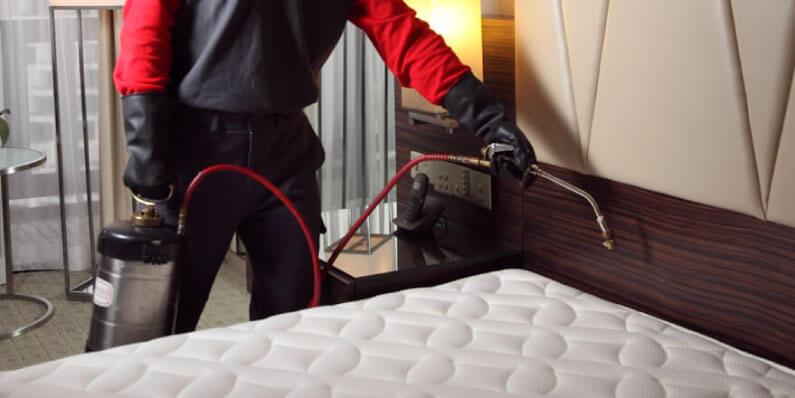Advanced Parasite Control Techniques for a Pest-Free Living Space
While typical pest control methods have their location, the development of sophisticated strategies offers a peek into a future where pest-free areas are not simply a desire however a truth. From Integrated Bug Monitoring strategies to sophisticated High-Tech Pest Keeping track of Solutions, a brand-new age of parasite control is arising.
Integrated Parasite Monitoring (IPM)
Integrated Parasite Administration (IPM) is an organized technique that concentrates on using different techniques to regulate parasites effectively while minimizing ecological influence and economic costs. This method incorporates numerous parasite control strategies such as organic control, habitat manipulation, alteration of social methods, and making use of immune crop varieties. By incorporating these methods, IPM aims to manage parasites in a sustainable and environmentally accountable way.
One key facet of IPM is the emphasis on avoidance as the very first line of defense versus insects. This involves surveillance bug populations, recognizing prospective risks, and implementing positive procedures to decrease pest problems before they come to be troublesome. By employing preventative procedures, IPM can considerably lower the requirement for chemical pesticides, thereby alleviating potential damage to non-target organisms and the bordering ecosystem.
Moreover, IPM advertises using pesticides just as a last resort and in a targeted way. This targeted approach reduces chemical use, lowers the danger of chemical resistance in insect populaces, and aids maintain a much healthier environment for both people and wild animals. On The Whole, Integrated Insect Monitoring stands as a comprehensive and sustainable remedy for effective insect control while focusing on ecological conservation and financial efficiency.
All-natural Repellents and Deterrents
Using natural repellents and deterrents is a sustainable and environment-friendly technique to handling parasite populaces in numerous settings. All-natural repellents work by leveraging fragrances or compounds that pests find undesirable or frustrating, driving them away from the area.
Physical deterrents also play a substantial duty in pest control. By including natural repellents and physical deterrents right into pest administration strategies, individuals can develop a pest-free living area while reducing the ecological impact.
Targeted Insect Exemption Techniques
When applying effective bug control approaches, targeted insect exemption strategies are crucial for avoiding details pests from accessing or infesting an assigned location. These strategies involve recognizing the vulnerabilities that pests may make use of to gain access and implementing measures to obstruct their access factors. Common exemption approaches include securing splits and gaps in walls, floors, and structures making use of products like caulk or steel woollen to avoid rodents and bugs from entering. Installing door sweeps, screens on windows, and weather stripping can also help keep bugs out. For exterior rooms, making use of cord mesh to cover vents and smokeshafts can deter wildlife intruders. Additionally, maintaining a bed bug exterminator houston services tidy and clutter-free setting lowers concealing spots for insects, making it much easier to detect and address any type of prospective problems without delay. By concentrating on targeted pest exemption strategies, homeowners can produce a robust defense versus undesirable intruders, advertising a pest-free space.
Biological Control Methods

One common biological control technique is the intro of killer insects like ladybugs or parasitic wasps that prey on particular bugs, maintaining their populations in check. These predators function as an all-natural kind of pest control without the need for chemical interventions. Furthermore, microbial insecticides obtained from normally taking place microorganisms, fungi, or viruses can infect and kill bugs while posturing minimal danger to people and advantageous bugs.
Carrying out organic control approaches calls for a comprehensive understanding of the environment and the parasites Click Here present to introduce the most effective natural enemies. By integrating biological control into insect administration techniques, house owners can accomplish a pest-free space while advertising eco-friendly balance and reducing reliance on chemical pesticides.
High-Tech Bug Monitoring Equipments
Advanced digital gadgets play a critical role in contemporary pest control by giving specific and real-time data via state-of-the-art pest surveillance systems. These systems use sophisticated innovation to detect and track bug activity, enabling very early intervention and targeted therapies. Modern pest surveillance systems typically contain sensing units, cameras, and automated information analysis tools that provide unequaled understandings into bug behavior and patterns.

Additionally, state-of-the-art bug surveillance systems are made to be straightforward, with instinctive user interfaces that assist in simple analysis of information. By leveraging these cutting-edge devices, parasite control specialists can carry out a lot more efficient and sustainable strategies, ultimately developing pest-free atmospheres for property and industrial important site spaces alike.
Conclusion
Finally, applying sophisticated bug control methods such as Integrated Pest Monitoring, natural repellents and deterrents, targeted pest exemption strategies, biological control methods, and sophisticated parasite surveillance systems can successfully create a pest-free home. By utilizing a combination of these strategies, people can stop and handle pest problems in a lasting and environmentally pleasant way. It is important to focus on insect control procedures to make certain a healthy and comfortable living setting.